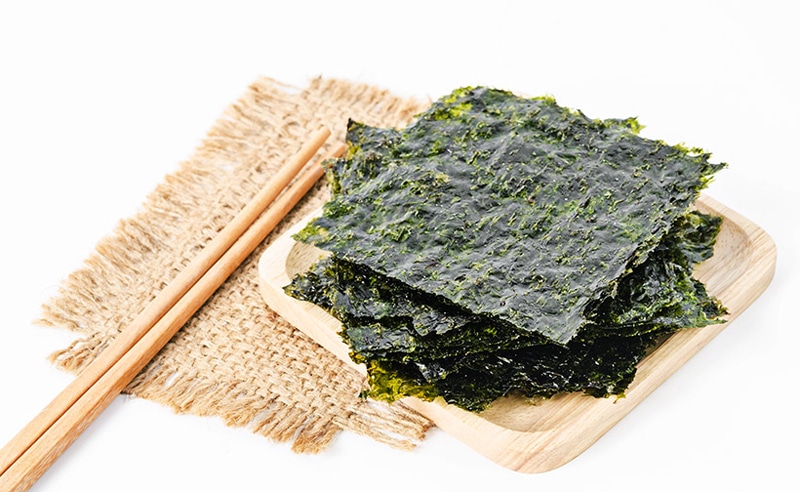Contents
What is Nori?
Nori is a type of edible seaweed that belongs to the red algae family. It is widely recognized for its use as a wrapper for sushi and other Japanese dishes. Nori has a delicate texture and a unique umami flavor, making it a popular choice for enhancing the taste and presentation of various culinary creations.The Origins of Nori
Nori has a rich history that dates back centuries. Its consumption can be traced back to ancient China and Japan, where it was primarily harvested from natural sources along the coastal regions. Over time, the cultivation of nori became more widespread, and today, it is extensively cultivated in countries like Japan, China, and Korea.Nutritional Value of Nori
Despite its thin and delicate appearance, nori is packed with essential nutrients. It is a great source of vitamins A, C, and E, as well as minerals such as iodine, iron, and calcium. Additionally, nori is low in calories and fat, making it a healthy choice for those looking to maintain a balanced diet.Culinary Uses of Nori
Nori is most commonly associated with sushi, where it is used to wrap the rice and other fillings. However, its culinary applications go beyond sushi. Nori can be used to add a flavorful twist to salads, soups, and noodle dishes. It can also be crumbled and sprinkled over various dishes as a garnish, providing a delightful crunch and enhancing the overall taste.Health Benefits of Nori
Apart from its nutritional value, nori offers several health benefits. The high iodine content in nori supports thyroid function, while the antioxidants present in it help protect against oxidative stress and inflammation. Additionally, nori contains compounds that may have anti-cancer properties and contribute to cardiovascular health.Incorporating Nori into Your Diet
If you’re looking to incorporate nori into your diet, there are several easy and delicious ways to do so. You can start by experimenting with homemade sushi rolls, where nori serves as the outer layer. Alternatively, try adding strips of nori to your salads or soups for an added burst of flavor. You can even enjoy nori as a standalone snack by lightly toasting it and seasoning it with spices of your choice.Nori: A Sustainable Food Option
In recent years, there has been a growing focus on sustainable food choices. Nori aligns well with this trend as it is a highly sustainable food option. The cultivation of nori requires minimal freshwater and land resources, making it an environmentally friendly choice. Additionally, nori farming helps improve water quality by absorbing excess nutrients from the surrounding aquatic environment.Tips for Storing Nori
To ensure the freshness and flavor of nori, proper storage is essential. It is best to store nori in a cool, dry place away from direct sunlight. Sealed containers or resealable bags can help maintain its crispness. Once opened, it is advisable to consume nori within a reasonable period to avoid any loss of quality.Popular Nori Recipes
Nori’s versatility makes it a popular ingredient in various recipes. Here are a few delightful dishes that feature nori as a star ingredient:- Nori-wrapped salmon rolls with avocado
- Spicy tuna sushi rolls with nori
- Nori chips seasoned with sesame and sea salt
- Nori-wrapped vegetable spring rolls
- Nori-wrapped rice balls with pickled plum filling
Nori in the World of Sushi
When it comes to sushi, nori plays a vital role. It serves as the wrapper that holds the sushi rice and other fillings together. Nori adds a distinct flavor and texture to sushi, enhancing the overall taste experience. Its unique properties make it an indispensable component in the art of sushi-making.Nori: Beyond Sushi Wrapping
Although commonly associated with sushi, nori has uses beyond just wrapping. It can be crumbled and added to rice dishes, used as a seasoning for stir-fries, or incorporated into homemade snack bars. The versatility of nori opens up a world of possibilities in the kitchen, allowing you to explore new flavors and culinary creations.Exploring Nori Varieties
While the most commonly known variety of nori is the black seaweed sheets used for sushi, there are other types worth exploring. Some varieties include green nori, which has a milder flavor, and purple nori, which is known for its rich taste and vibrant color. Each variety offers its unique characteristics and can be used creatively in different dishes.Potential Risks and Allergies
Although rare, some individuals may have allergies or sensitivities to seaweed products like nori. It is essential to be aware of any potential allergic reactions and consult with a healthcare professional if necessary. Additionally, excessive consumption of nori may lead to an excessive iodine intake, which can have adverse effects on thyroid function. Moderation is key when incorporating nori into your diet.Temaki Sushi: The Hand Roll
Frequently Asked Questions (FAQs)
Q: Can nori be used in vegetarian and vegan dishes? A: Absolutely! Nori is a fantastic ingredient for vegetarian and vegan dishes. It adds flavor, texture, and nutritional value to plant-based meals. Q: How long does nori last once opened? A: Properly stored, nori can retain its quality for several months after opening. However, it is recommended to consume it within a reasonable timeframe for the best taste. Q: Can I use nori as a replacement for tortillas in wraps? A: Yes, nori can be used as a healthier alternative to tortillas in wraps. It adds a unique taste and is lower in calories compared to traditional wraps. Q: Is nori suitable for people with gluten intolerance? A: Yes, nori is gluten-free, making it a safe option for individuals with gluten intolerance or celiac disease. Q: Can I find nori in local supermarkets? A: Yes, nori is widely available in most well-stocked supermarkets, particularly in the international or Asian food sections.Is Fresh Basil the Only Herb I Can Use for Authentic Spaghetti Sauce?
Fresh basil spaghetti sauce is undeniably a classic choice, but it’s not the only herb that can enhance your authentic spaghetti sauce. Herbs like oregano, thyme, and parsley can bring distinct flavors to the sauce, creating a delightful harmony of tastes. Experiment with different combinations to find your perfect blend of herbs for a truly authentic spaghetti sauce experience.










